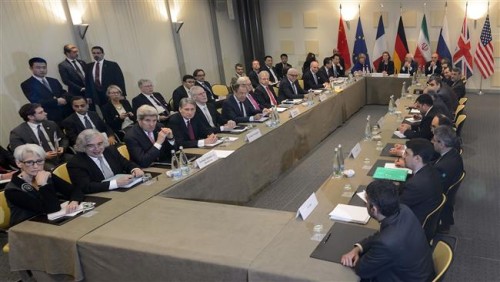UPDATE 1900 GMT: With talks in Lausanne likely to extend beyond the midnight deadline, The Guardian offers insight into the diplomatic manoeuvres today:
When the Russian Foreign Minister, Sergei Lavrov, returned to the Swiss lakeside town [this afternoon] after a 24-hour trip to Moscow, he is said to have started vocally questioning previously agreed positions.
Before leaving Moscow, Lavrov said that all UN sanctions should cease after a final deal is signed in June. [That is] an apparent break from the common negotiating position that the sanctions would only be lifted in stages, in response to concrete steps by Iran to dismantle some of its nuclear infrastructure.
“There are different options,” the Russian foreign minister said. “A full cancellation, or an initial suspension followed by abolition in the legal sense … But in practice this must mean that the sanctions must cease to work.”
Lavrov’s shift on UN sanctions appears to be the source of Iranian chiding this afternoon that they are waiting for “a coordinated position” among the 5+1 Powers.
It also explains the cryptic statement of Iranian negotiator Hamid Ba’eedinejad on State TV (see below), “Sanctions relief issue has been resolved. There are issues which are related to sanctions which are still under consideration.”
In another possible sign of complications, Chinese Foreign Minister Wang Yi left Lausanne for Beijing on Tuesday night.
UPDATE 1735 GMT: Iranian senior negotiator Hamid Ba’eedinejad is speaking from Lausanne on Iranian State TV. He points to an extension of discussions:
It’s natural that talks may need time. The 5+1 Powers need more internal coordination.
We don’t know when talks will conclude. That depends on when final decisions are made….
We have a deal when all issues are resolved. There are still some issues unresolved.
Ba’eedinejad said cryptically, “Sanctions relief issue has been resolved. There are issues which are related to sanctions which are still under consideration.”
UPDATE 1100 GMT: Unnamed officials have told the Associated Press that Iran and the 5+1 Powers will issue a general statement merely agreeing to “continue negotiations in a new phase”, hoping to reach a comprehensive settlement by the formal deadline of July 1.
If true, the statement is an effective admission that the two sides have failed to agree General Principles by tonight’s informal deadline.
Instead, the joint statement will be accompanied by documents that “outline more detailed understandings”, so Iran and the 5+1 can claim enough progress to continue discussions.
The final version of the documents are being confirmed among the 5+1, and the Iranian side has not yet signed off on them, said one official.
Members of the Iranian team have pushed back against the report:
Sources close to #NuclearTalks reacting to AP report today: Discussions are still continuing. No decision has been so far. #IranTalks
— Nuclear Talks (@NuclearTalks) March 31, 2015
One Iranian official told Reuters, “The two sticking points are the duration [of the agreement] and the lifting of sanctions.”
Iran and the 5+1 Powers have resumed nuclear talks in Switzerland on the last day before an informal deadline for a general agreement.
The Foreign Ministers of the 5+1 (US, Britain, France, China, and Russia) have already met this morning — with Russia’s Deputy Foreign Minister representing Sergei Lavrov, who left Lausanne on Monday night — and a plenary session with Iran began just before 8 a.m. local time and ended about 40 minutes later.
The deadline for a comprehensive deal is July 1, but last month the US said that an agreement on General Principles must be reached by March 31.
A senior Iranian negotiator, Hamid Ba’eedinejad, said late Monday that “there is no talk” of an extension beyond tonight: “All emphasize that the chance should not be missed and they are all doing their best. The marathon meetings will continue so as we reach a final agreement.”
Ba’eedinejad explained that “important political aspects” still have to resolved.
The two sides are still debating issues such as Iran’s research-and-development uranium centrifuges; the timing of the removal of US-led sanctions; and the duration of an agreement.
Iranian Deputy Foreign Minister Abbas Araqchi, the lead Iranian negotiator, also indicated on Sunday that Tehran has not — contrary to earlier reports — agreed to ship almost all of its enriched uranium out of the country, a vital condition for the US and its allies.
The negotiations resumed last Thursday in Lausanne, with Iranian Foreign Minister Mohammad Javad Zarif and US Secretary of State John Kerry opening the discussions. The other Foreign Ministers of the 5+1 joined the talks over the weekend.

